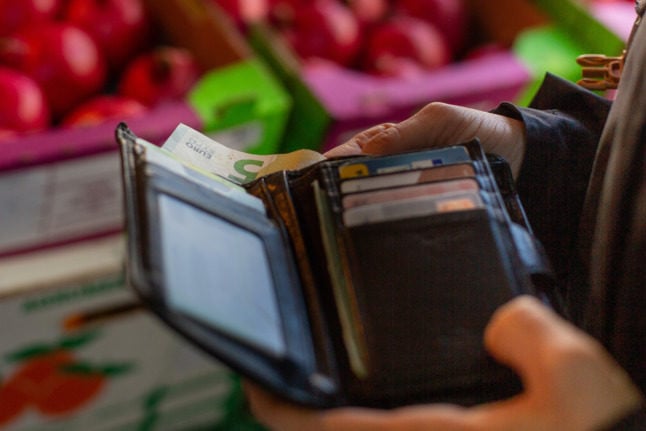Following a court ruling earlier this month that the federal government’s €60 billion off-balance sheet climate investment fund was unconstitutional, German politics is alive with talk of the budget crisis and how the government plans on fulfilling its promises to invest in the green transition and support Ukraine with both weapons and financial aid.
The reason is the Schuldenbremse – or debt brake – which limits the federal government to borrowing a maximum of 0.35 percent of GDP – about €9 billion. With the debt brake enshrined in the German constitution, it would require a two-thirds majority in the German Bundestag to overturn – an unlikely scenario in most German parliaments. Yet, despite the political chaos it’s causing, most Germans support it.
Schuldenbremse: What is Germany’s debt brake and how does it affect residents?
How popular is the debt brake?
Several recent polls find over 60 percent of Germans are against relaxing or getting rid of the debt brake.
Widerspruch zu diesem Titel @derspiegel: Die #Schuldenbremse hat nichts mit Sparsamkeit zu tun — im Gegenteil: der Staat wird langfristig nur dann nachhaltige Schulden haben, wenn er heute neue Schulden macht um Investitionen — Bildung, Innovativ, Infrastruktur — zu tätigen. pic.twitter.com/f8HYNZiTAc
— Marcel Fratzscher (@MFratzscher) November 22, 2023
These same polls also find that around 60 percent of think that the government should cut its spending to reduce its budget shortfall, rather than either raise taxes or take on more debt.
Ich bin auf der Seite der 57%. Wenn man nicht genug Geld hat, muss man zu allererst weniger ausgeben. #Schuldenbremse pic.twitter.com/B3ybeLxiij
— Sandra Weeser (@sandra_weeser) November 27, 2023
So just how indebted is Germany?
It turns out government indebtedness here is about 66 percent of GDP. That’s well under the UK, Canada, France, and the US – who all have indebtedness of between 101 and 121 percent of GDP. Italian debt sits at 144 percent of GDP – and Japan, now the world’s fourth-largest economy after Germany – runs debt of about 260 percent of its annual GDP.
1/2 Mängel: Die #Schuldenbremse legt 0.35% des BSP als Obergrenze fest und unterscheidet NICHT, ob mit dem Geld Bahngleise gebaut werden, auf denen die nächsten 50 Jahre Züge fahren, oder ob damit Zuschüsse für eine WM finanziert werden, die nächstes Jahr vorbei ist. 2/ pic.twitter.com/igmnFHNaMi
— Ruprecht Polenz @polenz.bsky🇪🇺🇩🇪🇮🇱🇺🇦🪝📯😇 (@polenz_r) November 21, 2023
With numbers like that, it’s safe to say Germany is unlikely to have a major debt crisis anytime soon.
READ ALSO: Scholz defends spending as budget crisis rocks Germany
What about Germans in their private life?
You won’t have to look very far to find debt aversion at all levels of German life. Whether it’s the constitutional debt brake or in everyday life.
Nick Mulder, Co-Founder and CEO of Hypofriend – a German-based mortgage broker that caters specifically to expats – says the German cultural fear of taking on debt is one of the many reasons why Germany has one of the lowest home ownership rates anywhere in Europe.
Less than half of people in Germany own their own homes, compared to about two-thirds in the UK, France, and Sweden.
“Germans are rather debt-averse, the word debt – ‘Schulden’ – literally means ‘faults’,” he says.
READ ALSO: Why is German home ownership so low?
Switzerland, Germany and Austria have the lowest rate of home ownership in Europe. pic.twitter.com/IsfLHAdeiK
— Xavi Ruiz (@xruiztru) May 30, 2023
The word Schuld can also mean guilt. It simply doesn’t evoke the same positive emotion it might in English if used a certain way – for example, when someone says “I’m in your debt” as a way to express thanks.
The German obsession with using cash also has roots in fear of taking on debt, with many people preferring to be able to count the notes in their wallet order to keep track of their spending better. About 56 percent of people in Germany have a credit card, yet only 29 percent use it regularly. That compares to a global average of 42 percent and around 80 percent in both Denmark and Israel.
Ask an expert: Why is cash still so popular in Germany – and is it changing?
Anyone renting an apartment in Germany for the first time might also have had to learn what a Mietschuldenfreiheitsbescheinigung is – which you get from your previous landlord to certify that you have no debt.
Renting in Germany: What to know about the ‘Mietschuldenfreiheitsbescheinigung’
Where does it come from?
German fear of debt is rooted in cultural traits, but also some deep historical trauma.
Government spending and ballooning debt during the 1920’s Weimar period helped fuel the hyperinflation that German historians still talk about a century later.
Studying that time will bring you across pictures of long lines for bread, with skyrocketing prices for basic goods that financially ruined many households and brought widespread starvation to Germany.
It was against this backdrop that Nazi leader Adolf Hitler was able to gain support, leading many Germans to blame debt-infused spending for laying the conditions for which the Nazis were able to gain power in Germany.
‘Day of fate’: Why November 9th is a crucial date in Germany history
Such historical memories and cultural attitudes came to the fore again during the 2008 financial crisis and the resulting euro crisis – which German newspapers tended to frame for a long time as a Schuldenkrise – or debt crisis – spurred on by overspending in southern EU countries like Greece and Italy.
Many Germans took these financial woes as a warning of what can happen to those who take on too much debt – and the current constitutional debt brake was instituted against this backdrop.
The world has obviously changed a lot since 2009, yet the debt brake – and an overall German aversion to debt – remain as popular and strong as ever.




 Please whitelist us to continue reading.
Please whitelist us to continue reading.
Member comments